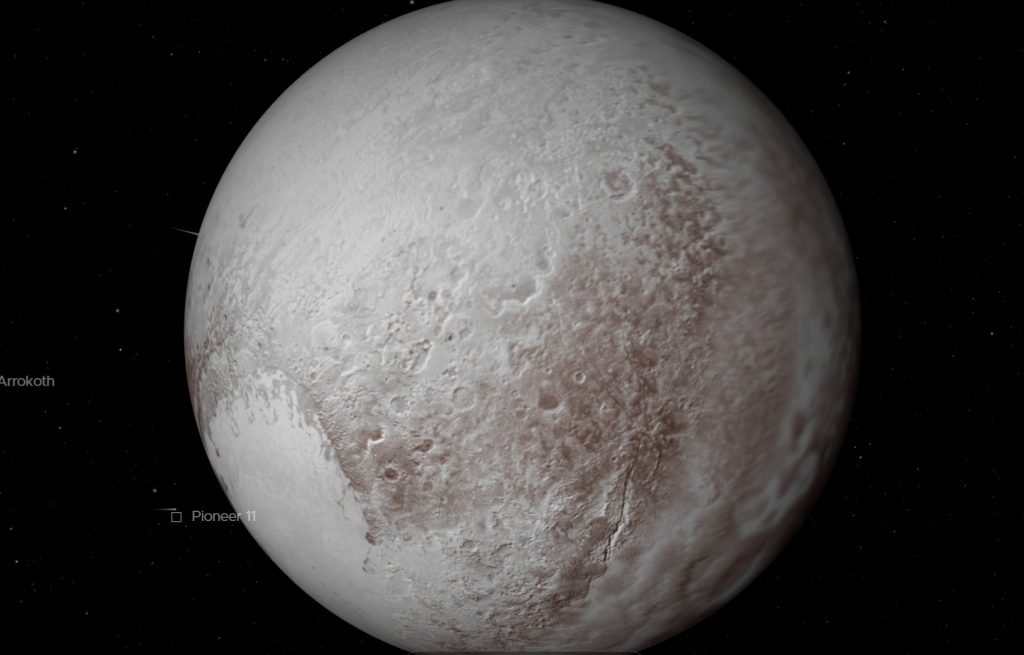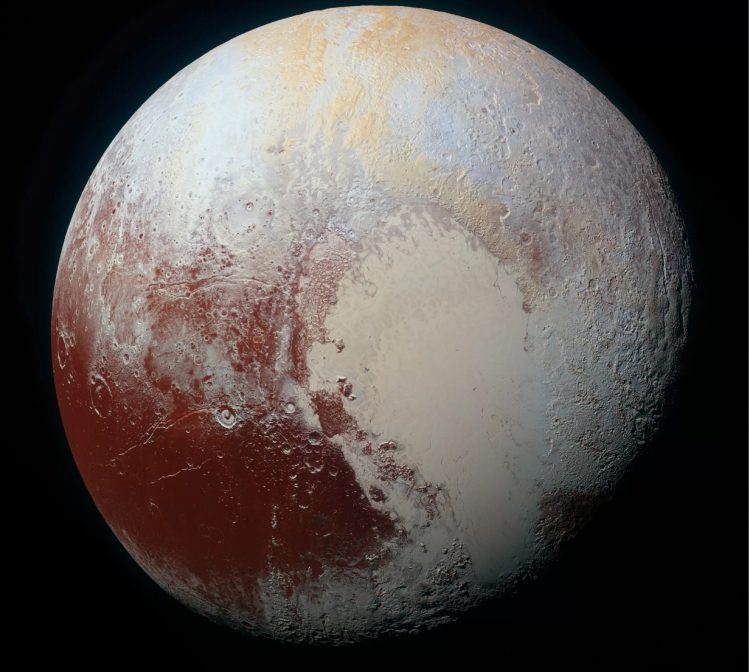Pluto, once considered the ninth planet in our Solar System, is a fascinating world with a complex history and unique characteristics. As a member of the Kuiper Belt, Pluto occupies a distinct position in the outer reaches of the Solar System. This comprehensive article delves into Pluto’s discovery, physical attributes, composition, atmosphere, moons, exploration history, and scientific significance.
I. Discovery and Historical Context
1. Discovery of Pluto
- Initial Observation: Pluto was discovered by American astronomer Clyde Tombaugh on February 18, 1930, at the Lowell Observatory in Arizona. Tombaugh, using a technique called “blink comparison,” compared photographic plates taken at different times to detect the moving object. The discovery was confirmed on March 13, 1930, and Pluto was named after the Roman god of the underworld.
- Early Observations: Early observations of Pluto revealed little about its size and composition. It was initially thought to be a large planet due to its apparent brightness. However, as observational techniques improved, it became clear that Pluto was much smaller than initially believed.
2. Planetary Status and Reclassification
- Planetary Status: For many decades, Pluto was classified as the ninth planet in the Solar System. Its discovery expanded our understanding of the outer reaches of the Solar System and contributed to the exploration of celestial objects beyond the classical planets.
- Reclassification: In 2006, Pluto was reclassified as a “dwarf planet” by the International Astronomical Union (IAU). This decision was based on the criteria that Pluto did not clear its orbit of other debris, one of the defining characteristics of a planet. The reclassification sparked considerable debate within the scientific community and among the public.
II. Physical Characteristics
1. Size and Shape
- Diameter and Volume: Pluto has a diameter of approximately 2,377 kilometers (1,477 miles). It is about one-sixth the size of Earth’s Moon, making it significantly smaller than the major planets in the Solar System.
- Shape and Rotation: Pluto is not a perfect sphere but is slightly elongated due to its low density and internal structure. It has a rotational period of about 6.39 Earth days. This means that a day on Pluto is roughly equivalent to 6.39 Earth days.
2. Surface and Composition
- Surface Features: Pluto’s surface is characterized by a diverse range of features, including mountains, plains, and ice deposits. The most prominent surface features include the heart-shaped region known as Tombaugh Regio, which is composed primarily of nitrogen ice, and the Sputnik Planitia, a vast plain of nitrogen and methane ice.
- Surface Composition: Pluto’s surface is primarily composed of a mixture of water ice, nitrogen ice, and methane ice. The varying compositions contribute to the planet’s colorful appearance, which ranges from white and gray to reddish-brown.
III. Atmosphere
1. Atmospheric Composition
- Gases and Pressure: Pluto has a thin atmosphere composed mainly of nitrogen, with trace amounts of methane and carbon monoxide. The atmospheric pressure on Pluto is extremely low, about 1/100,000th of Earth’s atmospheric pressure at sea level.
- Seasonal Changes: Pluto’s atmosphere undergoes significant seasonal changes due to its elliptical orbit. As Pluto moves closer to the Sun, the surface ice sublimates, creating a thicker atmosphere. Conversely, when Pluto is farther from the Sun, the atmosphere freezes back onto the surface.
2. Atmospheric Layers
- Stratosphere and Thermosphere: The atmosphere of Pluto is divided into several layers, including the troposphere, stratosphere, and thermosphere. The stratosphere is characterized by the presence of methane ice clouds, while the thermosphere exhibits high temperatures due to the absorption of ultraviolet radiation.
- Haze and Clouds: Pluto’s atmosphere contains a layer of haze, which is created by the interaction of sunlight with methane and other gases. The haze creates a pinkish tint in the atmosphere and contributes to the formation of transient clouds.
IV. Moons of Pluto
1. Charon
- Discovery and Characteristics: Charon, Pluto’s largest moon, was discovered in 1978 by astronomer James Christy. It has a diameter of approximately 1,212 kilometers (754 miles) and is about half the size of Pluto. Charon’s surface is marked by a large canyon system and a dark region known as the Mordor Macula.
- Orbital Dynamics: Charon and Pluto are tidally locked, meaning they always show the same face to each other. This synchronous rotation results in a unique binary system where both Pluto and Charon orbit a common center of mass outside Pluto.
2. Other Moons
- Nix and Hydra: Nix and Hydra are two smaller moons of Pluto, discovered in 2005 by the Hubble Space Telescope. Nix has a diameter of about 45 kilometers (28 miles), while Hydra is slightly larger, with a diameter of about 65 kilometers (40 miles). Both moons are irregularly shaped and have highly elliptical orbits.
- Kerberos and Styx: Kerberos and Styx are additional small moons of Pluto, discovered in 2011 and 2012, respectively. Kerberos has a diameter of about 19 kilometers (12 miles), and Styx has a diameter of about 16 kilometers (10 miles). Like Nix and Hydra, these moons have irregular shapes and orbits.
V. Exploration History
1. New Horizons Mission
- Launch and Journey: The New Horizons spacecraft was launched on January 19, 2006, by NASA with the mission to explore Pluto and its moons. After a journey of nearly 10 years, New Horizons made its closest approach to Pluto on July 14, 2015.
- Discoveries and Data: New Horizons provided the first detailed images and data of Pluto, revealing its complex surface features, atmospheric composition, and moons. Key discoveries included the discovery of vast plains of nitrogen ice, towering mountains of water ice, and the presence of a thin but dynamic atmosphere.
- Extended Mission: After its successful flyby of Pluto, New Horizons continued its mission to explore other objects in the Kuiper Belt. It conducted a flyby of the Kuiper Belt object Arrokoth (formerly known as 2014 MU69) on January 1, 2019, providing additional data on the outer Solar System.
2. Future Missions
- Proposed Missions: Various proposals have been made for future missions to Pluto and the Kuiper Belt. These missions could include orbiters, landers, and additional flybys to study Pluto in greater detail and explore other Kuiper Belt objects.
- International Collaboration: Future exploration of Pluto may involve international collaboration, combining resources and expertise from multiple space agencies to conduct comprehensive studies of the dwarf planet and its environment.

VI. Scientific Significance
1. Kuiper Belt Studies
- Understanding the Kuiper Belt: Pluto is a key object in the study of the Kuiper Belt, a region of the Solar System beyond Neptune that is populated with icy bodies and dwarf planets. Studying Pluto helps scientists understand the composition, formation, and evolution of the Kuiper Belt.
- Comparison with Other Objects: Research on Pluto provides insights into the properties and dynamics of other Kuiper Belt objects. By comparing Pluto with other objects in the belt, scientists can learn more about the formation and evolution of the outer Solar System.
2. Planetary Science
- Formation and Evolution: Pluto’s unique characteristics, including its composition, atmosphere, and moons, offer valuable insights into the processes that shaped the early Solar System. Studying Pluto helps scientists understand the formation and evolution of icy bodies and their interactions with other celestial objects.
- Atmospheric Studies: Pluto’s thin atmosphere and seasonal changes provide a unique opportunity to study the dynamics of atmospheric processes on a small, distant world. Understanding these processes helps scientists learn more about the range of atmospheric phenomena in the Solar System.
3. Dwarf Planet Classification
- Criteria and Debate: Pluto’s reclassification as a dwarf planet sparked significant debate within the scientific community. The decision was based on the criteria established by the International Astronomical Union (IAU), which defined a planet as a celestial body that orbits the Sun, is spherical in shape, and has cleared its orbit of other debris. Pluto did not meet the third criterion, leading to its reclassification as a dwarf planet.
- Impact on Planetary Science: The reclassification of Pluto has implications for the study of other celestial objects in the Solar System. It has prompted discussions about the definition of planets and the criteria used to classify celestial bodies.
VII. Cultural and Historical Impact
1. Mythology and Naming
- Naming: Pluto is named after the Roman god of the underworld, reflecting the tradition of naming celestial bodies after mythological figures. The name was suggested by Venetia Burney, an 11-year-old schoolgirl from England, and was chosen in part because it honored the work of the discoverer, Clyde Tombaugh, whose initials were represented in the name.
- Popular Culture: Pluto has captured the public imagination and has been featured in various forms of popular culture











































Discussion about this post